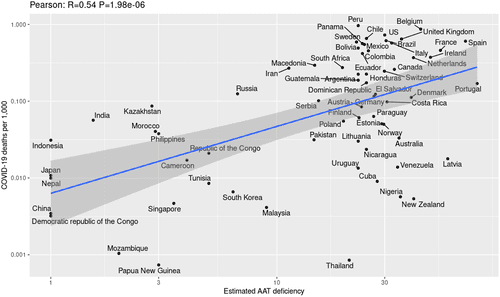
Ethnic Differences in Genetic Mutations May Partially Explain National Differences in COVID‐19 Death Rates
It isn’t only the quality of medical care one receives one’s age and general health that determine a person’s chances of surviving a COVID-19 infection. Tel Aviv University researchers who analyzed data from 67 countries found a strong positive correlation between the prevalence of the PiZ and PiS mutations in the gene coding for alpha-1 antitrypsin in the population and COVID-19 fatality rates (adjusted to the size of the population).
This discovery was relevant in many countries in Europe and North and South America, including the US, the United Kingdom, Belgium, Spain, Italy, Sweden, Brazil, Peru, and more. This is compared to low morbidity and mortality rates in countries in which these two mutations are less common such as China, Japan, South Korea, Taiwan, Thailand, Vietnam, and Cambodia.
In light of their findings, the researchers recommend – pending validation of their hypothesis with data from COVID-19 patients –the use of population-wide screening for detecting mutation carriers so as to ensure social distancing and prevent severe disease.
The two mutations lead to a deficiency in the alpha1-antitrypsin protein, which protects lung tissues from damage in case of severe infections. Other studies have already associated deficiency in this protein with inflammatory damage to lung function in other diseases.
The study was led by Prof. David Gurwitz, Prof. Noam Shomron, and MSc candidate Guy Shapira of Tel Aviv University’s Sackler Faculty of Medicine and published in the FASEB Journal earlier this month under the title “Ethnic differences in alpha‐1 antitrypsin deficiency allele frequencies may partially explain national differences in COVID‐19 fatality rates.”
Infection rates, severity, and fatalities due to COVID‐19 vary greatly between countries. With few exceptions, these are lower in East and Southeast Asian and Sub‐Saharan African countries compared with other regions, they wrote. “Differences in cultural customs have also been attributed a role. For example, wearing face masks was common in some Asian countries prior to the current pandemic, and this may have contributed to lower COVID‐19 infection and fatality rates in these countries.”
Analysis of databases reveals that in Belgium, where 17 of every 1,000 people carry the PiZ mutation – the more dominant of the two mutations discussed in this study – the COVID-19 mortality rate was 860 per million. In Spain the picture is similar – 17 of every 1,000 citizens carry the PiZ mutation, and the COVID-19 fatality rate is 640 per million. In the US, where 15 per 1,000 are carriers, 590 of every million died of the coronavirus.

(Map courtesy FASEB Journal)
The numbers in the UK are in line with the overall trend – 14 per 1,000 carry the mutation and 60 per million have died of COVID-19. In Italy, where 13 per 1,000 are carriers, the mortality rate is 620 per million. In Sweden, where 13 per 1,000 are carriers, the fatality rate is 570 per million.
On the other hand, the researchers found that in many countries in Africa and Southeast Asia, where these mutations are relatively rare, COVID-19 mortality rates are correspondingly low. In Japan, where nine of every million died in the pandemic, the mutations’ prevalence is insignificant. Similar numbers were also found in China, South Korea, Taiwan, Thailand, Vietnam, and Cambodia.
Before the Tel Aviv University research, no studies have reported associations of genetic variations between populations with COVID‐19 infection and fatality rates.
The researchers explained: “Our data analysis reveals a strong correlation between these mutations and severe illness and death from COVID-19. We call upon the research community to test our hypothesis against clinical data and on decisionmakers in every country to conduct population-wide screening for identifying mutation carriers and prioritize them for vaccination once COVID-19 vaccines have been approved. In the meantime, carriers should be notified that they may belong to a high-risk group and advised to maintain strict social isolation”
Israel in the News